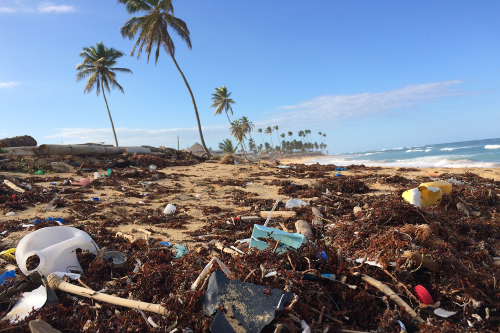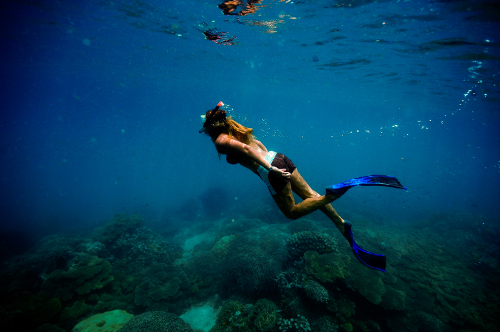De-plastic Fantastic
/(Updated 20 July 2019)
There have been increasing moves in the news to reduce plastic waste in at home, at work, and in our daily lives. But how do we reduce – or even better, eliminate – plastic from our trips and travels? Here we celebrate the positive progress that has been made worldwide, but not without highlighting some terrifying statistics, as we consider what impact plastic waste is having on our holiday destinations.
Click for De-plastic Your Travel : 5Rs for more Sustainable Tourism and Where to Love our Blue Planet Too.
Around the world, plastics make up 85% of marine litter, and reach people's lungs, air, water and food, impacting their health without even knowing it: 1 in 3 fish caught for human consumption contain plastic.
Every year, the world:
Produces over 300 million tons of plastic, set to double by 2034, half of which is single use.
Uses 500 billion plastic bags. More than 1 million bags are used every minute, their ‘working life’ just 15 minutes.
Allows approximately 8 million pieces of plastic pollution into our oceans daily: There may now be 5.25 trillion macro and microplastic pieces floating, weighing 269,000 tonnes - about the weight of 1345 adult blue whales and 500 times the number of stars in our galaxy. (Surfers against Sewage)
Sells a million plastic bottles every minute, a number predicted to jump 20 percent by 2021.
Has produced more plastic during the last ten years than the whole of the last century.
(PlasticOceans.org).Pollutes with plastic 100% of marine turtles, 59% of whales, 36% of seals and 40% of seabird species examined.
Kills 100,000 marine mammals and turtles and 1 million sea birds with marine plastic pollution annually.
Burns or dumps 30 double-decker busloads of plastics every 30 seconds in developing countries, causing up to 1 million deaths a year from diseases caused by waste.
Children playing around plastic waste are twice as likely to get intestinal bugs like cholera, the second biggest killer in under-fives.
91% of all plastic waste ever generated has not been recycled and ended up being incinerated, in landfill or in the natural environment (Science Advances, 2017).
Every year, the EU alone:
produces 25 million tonnes of plastic waste annually, less than 30% of which is recycled. (The Guardian)
Consumes 46 billion bottles, 36 billion straws, 16 billion coffee cups, 2 billion containers for takeout and 580 billion cigarette butts (Seas at Risk, 2017)
Thankfully, the world is now waking up to what it is doing to itself. Tackling the plastics problem is a must. But are we doing enough?
The global battle against plastic pollution
At least 127 countries (of 192 reviewed) had adopted legislation to regulate plastic by July 2018, according to a UN report. Legislation covers plastic bags, other single-use plastics and microbeads, and ranges from complete bans, to progressive phase-outs, to laws that incentivize the use of reusable bags, though enforcement can differ.
Since Bangladesh and India in 2002, more and more countries have signed up to various types of plastic ban, from Albania to Croatia, the Galapagos, Kenya, Madagascar, Morocco, Nepal, Rwanda, South Africa and Thailand to name but a handful. See Wikipedia for the latest full list of global plastic ban legislation.
In the European Union: In May 2018, the EU proposed a directive for a ban on the top 10 commonplace single-use plastics, such as cotton buds, cutlery and drink stirrers, which constitute 70% of all marine litter items, to help protect marine life.
Under the proposal, which focuses on disposable food and beverage-related plastics such as plastic plates, cups, straws and packaging, distribution of free-of-charge single-use plastic products will be banned where alternatives of more environmentally sustainable materials are readily available. However, it does not set a deadline for a total ban.
Other products will face reduction in consumption targets and will require manufacturers to cover costs of waste collection and treatment, such as with fishing gear, which accounts for 27% of all beach litter, and single-use plastic bottles, of which is wants 90% collected for recycling by 2025.
The EU estimates the ban will avoid 3.4 million tonnes of carbon emissions, prevent €22bn (£19.2bn) worth of environmental damage by 2030 and save consumers €6.5bn, as well as help the EU take leadership in creating sustainable goods, a market worth 2.5 trillion euros ($2.9 trillion) according to Unilever.
The plan will need to be approved by the 28 member states and the European Parliament before it can be passed. If approved, member states will need to make an active effort to implement the required action. But it does put moves in motion,and hopes to be approved by summer 2019.
In The UK: In January 2018, the plastic microbeads ban entered force. (The US banned them in 2015.) The tiny beads can no longer be used in cosmetics and personal care products. Previously they were found in products such as abrasive facial scrubs and toothpastes, which then washed into the sea, harming wildlife & entering the human food chain.
The UK Government’s Department of Food and Rural Affairs (DEFRA) 25 year Environmental Plan, “A Green Future”, to improve the UK’s air and water quality and protect threatened plants, trees and wildlife species, also ‘declared war on plastic’ and ‘throwaway culture’. It aims to eradicate all avoidable plastic waste within a generation, by 2042. It extends the 5p charge on plastic bags to all small retailers, encourages ‘plastic-free supermarket aisles’, fruit and vegetable wrapping, will consider other charges on single-use plastic items such as takeaway containers and cups/lids and includes government funding for plastics innovation, school environmental education, and support for developing countries reducing plastic waste and pollution through UK Aid.
In theory, of course, this is no bad thing. But it’s put little into actual place, and so has been heavily criticised as too long in duration, lacking ‘regulatory bite’, and as just a PR young vote-seducer. Never mind the voting statistics, what’s important is how much impact it could have, and that has been considered a missed opportunity,
“Britain's natural environment needs a 25-month emergency plan more than it needs a 25-year vision" - Greenpeace UK executive director, John Sauven (BBC).
Indeed, the plan may be riding on the wave of greater consumer awareness and emotive response to the damage done to nature by plastic, especially after Blue Planet 2.
The UK’s 25 year plan for 2042 may not make much of a dent on a global scale, but it could help the Marine Conservation Society’s Great British Beach Clean Up, which found 718 pieces of litter for every 100m stretch of beach surveyed in the UK, mostly polystyrene and packets, at least 20% from food and drink rubbish, and the subsequent impact on our bodies.
In the USA: With States like California, the world’s 5th largest economy, leading the charge, along with efforts from Hawaii and major cities such as San Francisco and Seattle, there is potential for global impact. Other States have mandatory recycling or reuse programs, and have taken steps to reduce plastic consumption and waste on a local level on certain products, but a country-wide ban of single-use plastic is far off, especially with several States placing pre-emptive bans on banning plastic bags…
Some organisations take a leadership role voluntarily. Want to experience Blue Planet too for real? In the tourism sector, you can’t get much better than Chumbe Island Coral Park for marine conservation, the world’s first private protected marine area, entirely funded by ecotourism. An amazing holiday here will help dedicated marine and coral scientific research, conservation and education. More info >
Responsible tourism and responsible business takes responsibility.
For actions and for impacts.
In this way, some organisations hold themselves accountable to their own stringent targets and doing the right thing. For example, rather than wait for any UK policy, Iceland (the supermarket retailer, not country) has quickly announced all its own-label products will be plastic packaging free within five years, by 2023.
It should come as no surprise that sustainable tourism specialists are ahead of the game: Cayuga Collection lodges such as Lapa Rios in Costa Rica and Jicaro Island in Nicaragua have pursued a single-use plastic purging strategy for many years, whereas the rest of hospitality and tourism is just starting to wake up.
Oceans of Plastic
Our marine conservation blog reveals that,
at current rates of plastic pollution, by 2050 oceans are expected to contain more plastics than fish (by weight) (WEF).
Another estimate is for more than 70 million tons of plastic - plastic bags, straws, bottles, toothbrushes, toys - ending up in world’s oceans, accumulating over the world’s beaches and in the seas’ “gyres” - the centres of oceanic currents, 90% from just 10 rivers.
Plastic takes centuries to break down, wildlife and birds get caught in it, or are killed by consuming it: The algae that grows on plastic waste can even smell like food (Guardian), making it attractive to eat. One million seabirds and 100,000 marine mammals die each year, some even from inability to eat food, with so much plastic in their stomachs.
Whilst emotive, this might not communicate just how much we all depend on healthy oceans, no matter how far away from water we are, because of how plastics get into our food chain.
To tackle it, the Galapagos Islands are studying garbology - the science of waste flows in the ocean, and inevitably looking at the waste’s source manufacturers.
Such garbology has also led to Coca-Cola, Pepsi and Nestlé named as the world’s top plastic polluters for the third year in a row (2020) in as annual audit, undertaken by 15,000 volunteers around the world, with Coca-Cola waste more than PepsiCo and Nestlé combined, leading inevitably to more pressures to find corporate responsibility solutions reduce .
In August 2017, our ocean conservation expedition partners co-founded by Emily Penn (often seen on BBC news and Sky Ocean Rescue), undertook the first continuous plastic sampling while circumnavigating the British Isles, focusing on the science behind marine plastic pollution, potential solutions, and public engagement and awareness.
Making the unseen, seen is an important part of the work. Our water may look clear but what's actually in it? They tested for toxic pollutants such as pesticides, flame retardants and fluorinated compounds, which adhere to the surface of plastic pollution. Many of these are endocrine disruptors, which mimic hormones and can impact pregnancies and be passed on to children through childbirth and breastfeeding. Emily tested her own blood for chemicals banned by the United Nations;
Out of 35 chemicals, Emily's blood contained 29 banned by the UN. (Parley.tv).
Would you like to join an ocean conservation expedition with the organisation Emily orginally set up? Enquire >
Sustainable Development
Rather than aim for 2042, we'd like to see UK initiatives form part of the work towards the United Nations Global Sustainable Development Goals, to which it signed up voluntarily in 2015 along with 192 other countries, and include Sustainable Development Goal 14 , ‘Life Under Water’, the sustainability of the seas and marine resources. These feed into the UN global sustainable development Agenda 2030 deadline.
The EU, following hot on the heels of the UK with its own Plastics Strategy war against plastic waste, and spurred into action by China’s decision to ban waste imports, has made its deadline 2030 to ensure all plastic packaging is reusable or recyclable and align with Agenda 2030. Only about 30% or Europe’s 26 million tons of plastic a year is currently recycled; oil-derived plastic mostly ends up in landfills or incinerated, often elsewhere, some dumped in the ocean as a result of poor port management. However, China's ban may just mean other countries such as Malaysia or Vietnam may step in to take up the surplus and see the impacts of plastic pollution merely displaced.
The plans to tackle plastic pollution are vital for the world. Unlike Europe, the UK's seems to fall short of real action in the time required for the UN's Global Goals for 2030. Quicker action would be an improvement, but real disposal also key: Shifting off shore is not the answer!
As with many conscious concerns, it appears that private enterprise actions and consumer demand are what will make a short term difference.
So what can you do to prevent plastic pollution yourself, especially when you travel?
Check out our suggestions to de-plastic your travel for more sustainable tourism.



















